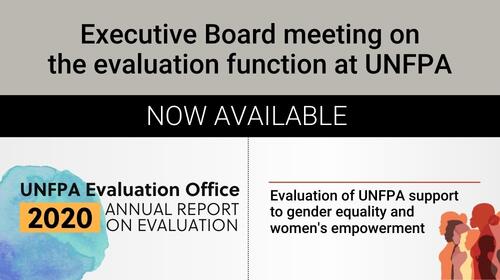On 10 June 2021, at the Executive Board Annual Session 2021, UNFPA Executive Director, Dr. Natalia Kanem, commended the Evaluation Office for its nimbleness in adapting evaluation to the COVID-19 pandemic, which generated evidence for an informed recovery and the new Strategic Plan 2022-2025. She further emphasized that when policies and programmes are informed by credible evaluative evidence there is a powerful multiplier effect on sustainable development.
Marco Segone, Director, UNFPA Evaluation Office presented the 2020 Annual Report on the evaluation function at UNFPA. The annual report captures the performance, key achievements and areas of growth for the evaluation function at centralized and decentralized levels. The report particularly details UNFPA efforts and initiatives to adapt evaluation in a dynamic and real-time basis to the COVID-19 crisis, to inform the global response to the pandemic and to inform evidence-based decision making at UNFPA, particularly in the context of the Strategic Plan 2022-2025.
The report also captures the contribution of UNFPA to the UN coherence in evaluation, including through joint and system-wide evaluations and system-wide initiatives to the COVID-19 response. It provides details on UNFPA efforts to strengthen multi-stakeholder partnerships for national evaluation capacity development, including through the new advocacy initiative, ‘Decade of EVALUATION for Action’, also known as the Eval4Action campaign. The Evaluation Office co-leads the campaign with the EvalYouth Global Network and Global Parliamentarians Forum on Evaluation to strengthen influential evaluation in the context of the Sustainable Development Goals.
The Evaluation Office further presented the results of the evaluation of UNFPA support to gender equality and women’s empowerment (2012-2020). The evaluation provides evidence and lessons learned to inform UNFPA work on gender equality and women’s empowerment, across development, humanitarian and peace contexts. This was followed by the management commentary to the annual report and management response to the evaluation.
Following UNFPA presentations, 28 Member States (Australia, Austria, Belgium, Canada, Denmark, France, Finland, Germany, Greece, Hungary, Iceland, Ireland, Israel, Italy, Japan, Luxembourg, Mexico, the Republic of Moldova, Montenegro, the Netherlands, New Zealand, Norway, Spain, Sweden, Switzerland, Türkiye, the United Kingdom, and the United States of America), in a joint statement commended the Evaluation Office’s flexibility to adapt the evaluation function to the needs in the COVID-19 context.
The Member States commended the Evaluation Office for its excellent performance, achieving almost all targets of the key performance indicators. The Member States also highly valued Evaluation Office’s commitment and active support to the reform agenda and system-wide and joint evaluations on the central, regional and country level, including its support to independent system-wide evaluation mechanisms.
The Member States welcomed the strengthening of the decentralized evaluation system, the progress in implementing the evaluations’ management responses, and the steady increase of UNFPA evaluation expenditure ratio over the years. They also welcomed efforts towards continuous innovation in gender equality and women’s empowerment. The joint statement also stressed the centrality of the evaluation function in furthering the effective implementation of strategic plans and evidence-based decision-making.
